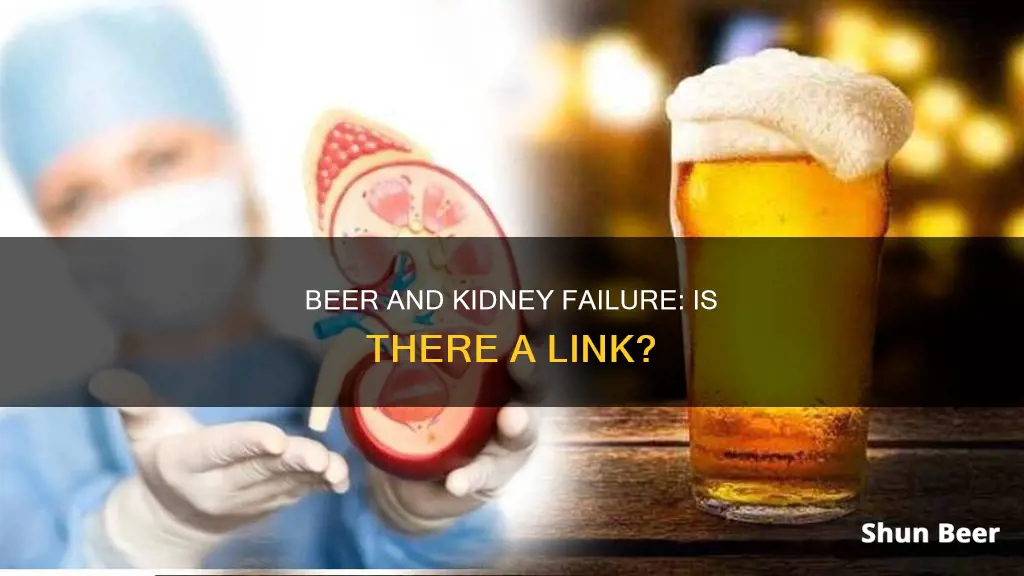
Alcohol can have a detrimental effect on kidney health, and excessive drinking can lead to acute kidney failure. Alcohol is a toxin that the kidneys must filter, and it can cause changes in kidney function, making it harder for them to filter blood. Alcohol also affects the kidneys' ability to regulate fluid and electrolyte levels in the body, and can cause dehydration. In addition, alcohol consumption can increase the risk of high blood pressure, which is a common cause of kidney disease. While light to moderate drinking may not be harmful, heavy drinking and binge drinking are associated with a higher risk of kidney disease. Therefore, it is important to drink in moderation to protect kidney health.
| Characteristics | Values |
|---|---|
| Beer consumption and kidney failure | Yes/No |
| Can one or two beers cause kidney failure? | No |
| Can heavy drinking cause kidney failure? | Yes |
| Can binge drinking cause kidney failure? | Yes |
| Can alcohol cause kidney disease? | Yes |
| Can alcohol worsen kidney disease? | Yes |
| Can alcohol cause acute kidney injury? | Yes |
| Can alcohol cause high blood pressure? | Yes |
| Can alcohol cause dehydration? | Yes |
| Can alcohol cause liver disease? | Yes |
What You'll Learn

Beer and kidney function
Excessive alcohol consumption can have detrimental effects on kidney function. Beer, as a form of alcohol, can therefore impact the kidneys when consumed in large quantities. However, in moderation, beer drinking does not increase the risk of developing kidney disease.
The kidneys play a vital role in filtering harmful substances from the blood. Alcohol is one such toxin that the kidneys work to remove from the body. When alcohol is consumed in excessive amounts, it can cause changes in kidney function, impairing their ability to filter blood effectively.
In addition, alcohol affects the kidneys' ability to regulate fluid balance in the body. Alcohol has a dehydrating effect, which can impact the normal function of cells and organs, including the kidneys. This dehydration can also lead to an increase in blood pressure, which is a common cause of kidney disease.
Furthermore, alcohol consumption can disrupt the hormonal control mechanisms that govern kidney function. It can also promote liver disease, which in turn has detrimental effects on the kidneys, including impaired sodium and fluid handling and even acute kidney failure.
When it comes to alcohol consumption, moderation is key. According to experts, one drink per day for women and one to two drinks per day for men is generally considered a safe amount. Binge drinking, on the other hand, is defined as consuming four to five drinks within a short period, and can lead to dangerous levels of blood alcohol, increasing the risk of acute kidney injury.
For individuals with chronic kidney disease, even a modest amount of alcohol could have an impact on their health. It is important for those with kidney disease to be mindful of their fluid intake, as the kidneys may not be able to process large amounts of fluid effectively. Alcohol, being a liquid itself, contributes to the daily fluid intake and can lead to fluid overload if not carefully monitored.
Additionally, alcohol can interact with certain medications, including those for diabetes, heart disease, and high blood pressure, which may further impact kidney function.
The Bottom Line
While moderate alcohol consumption, such as enjoying a beer or two, does not directly harm the kidneys, excessive drinking can lead to kidney damage and increase the risk of kidney disease. It is important to drink in moderation and be mindful of any medications or health conditions that may be affected by alcohol consumption.
Beer and Amoxicillin: Safe Mix?
You may want to see also

Alcohol and high blood pressure
Drinking alcohol, especially in large quantities, can have a significant impact on your blood pressure. Excessive drinking is defined as consuming more than four drinks per day, and this can negatively affect your health in multiple ways, including raising your blood pressure. High blood pressure, or hypertension, is the most common alcohol-related health problem, and many people are unaware that they suffer from it.
When you drink a lot of alcohol, it can cause the muscles in your blood vessels to narrow. This narrowing then forces the heart to work harder to push blood around your body, leading to an increase in blood pressure. The more alcohol you consume, the higher the risk of developing hypertension. Regular drinking, especially if you're over 35, puts you at risk, and even one drink a day can increase the likelihood.
Binge drinking and long-term heavy drinking can also lead to strokes, as alcohol causes the heart to beat too quickly or irregularly (arrhythmias). Additionally, excessive alcohol consumption can lead to alcoholic cardiomyopathy, where the heart muscle stretches and droops, impacting its ability to pump blood effectively.
High blood pressure caused by alcohol consumption can be prevented and managed by limiting your alcohol intake. The American Heart Association recommends no more than two drinks per day for men and one drink per day for women. It's important to note that red wine, while linked to improved heart health in small amounts, is not a miracle drink, and any positive effects are likely due to other lifestyle factors.
If you are struggling to cut back on alcohol, it is crucial to seek help from a healthcare professional. They can provide guidance and support to reduce your alcohol consumption and manage your blood pressure.
Beer and Kidney Health: Long-Term Drinking Effects
You may want to see also

Alcohol, kidney disease and heart health
Excessive alcohol consumption can harm the kidneys and lead to high blood pressure, dehydration, and liver disease. The kidneys are responsible for filtering harmful substances from the blood, including alcohol. When the body consumes too much alcohol, the kidneys have to work harder, and this can cause changes in kidney function, making them less able to filter the blood. Alcohol also affects the kidneys' ability to regulate fluid and electrolyte balance in the body, and can cause dehydration.
Alcohol and Kidney Disease
Drinking more than four drinks a day can affect your health and worsen kidney disease. Binge drinking, or consuming more than four to five drinks within two hours, can cause a person's blood alcohol level to reach dangerous levels, leading to acute kidney injury. Acute kidney injury is a sudden drop in kidney function that often goes away with time but can sometimes lead to lasting kidney damage. Regular heavy drinking, defined as more than eight drinks per week for women and more than 15 drinks per week for men, has been found to double the risk of kidney disease.
If you have kidney disease, drinking alcohol can impact your heart health. Alcohol can cause an increase in blood pressure and heart rate. Over time, high blood pressure can increase your risk of heart attack and stroke. Additionally, alcohol can interact with medications for heart disease and high blood pressure, affecting their effectiveness. It is important for individuals with kidney disease to monitor their alcohol consumption and keep it within safe limits to maintain their kidney and overall health.
Beer and Clonazepam: Safe Mix or Risky Business?
You may want to see also

Alcohol's impact on kidney structure
Alcohol can directly affect the kidneys by altering their form and structure. Various animal studies have demonstrated this. For example, in a study on dogs, investigators observed that the basement membrane of the glomerulus (the tiny ball of unusually permeable capillaries that filters blood plasma) became abnormally thickened and was characterised by cell proliferation. Further changes included enlarged and altered cells in the kidney tubules.
Another study compared kidney structure and function in alcohol-fed and control rats. The alcohol-fed group experienced kidney swelling and significantly reduced kidney function. Under microscopic examination, the kidneys of alcohol-fed rats were found to have cells enlarged with increased amounts of protein, fat, and water, compared with those of the control animals.
Beer and Flying: What's the Safe Limit?
You may want to see also

Alcohol, kidney disease and medication
Alcohol interacts with many medications. It can cause certain medications to have a stronger effect on your body or even make some medications less effective. The impacts can be felt with diabetes medication, heart medication, sleeping medication, pain medication, and many others. It is important to talk with your pharmacist or physician and ask whether it is safe to drink alcohol while taking your medications.
Alcohol can make your blood pressure and heart rate go up. Over time, this high blood pressure can increase your risk of heart attack and stroke. So, if you have high blood pressure, heart disease, or have had a stroke, be mindful of what happens if you have a drink and monitor your blood pressure and heart rate closely.
If you are on a fluid restriction, don't forget to count the alcohol. Some people with kidney disease need to limit the amount of fluid that they take in because their kidneys are not able to process and get rid of a lot of fluid. If they take in too much fluid, it can build up as edema in the legs or in the lungs.
Maintain self-control when you drink. If you are like most people, you reach for the salty snacks and are not as careful about your other dietary restrictions and health habits when you have a drink or two. That can lead to forgetting medications, eating too many sugary snacks, or consuming a full bag of potato chips. Keep your alcohol intake below the level where you lose some control over your behaviors.
According to the Centers for Disease Control and Prevention, heavy drinking typically means having more than eight drinks per week for women and more than 15 drinks per week for men, and binge drinking is typically defined as having four or five drinks on a single occasion. Those activities are associated with multiple health problems and are always unsafe. Stick to one standard drink a few times a week to keep it safely under these levels.
Beer and Bowel Movements: Constipation Connection
You may want to see also







